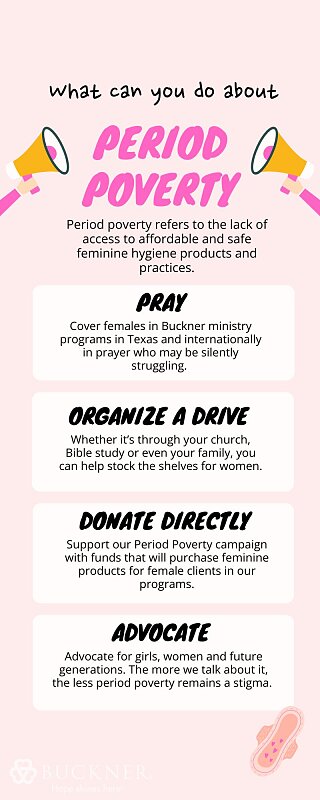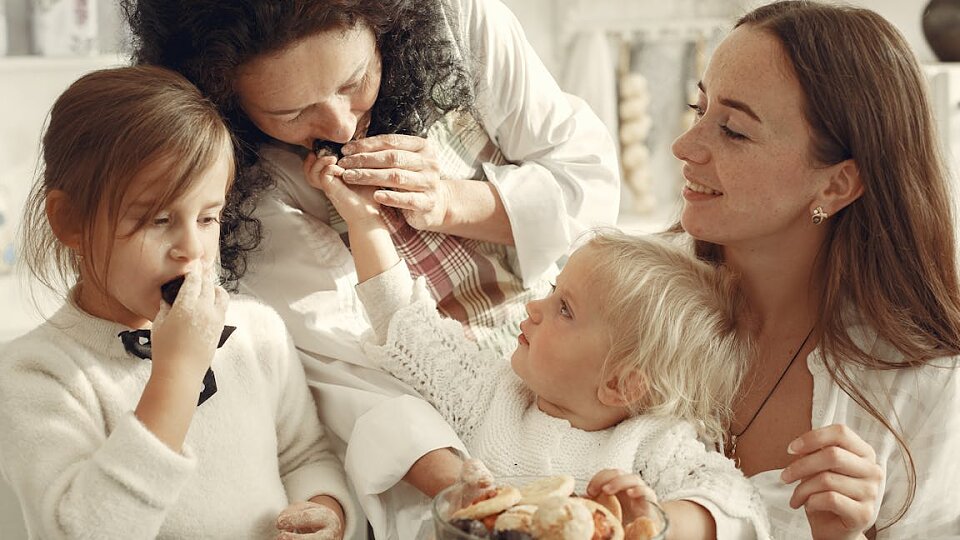World Menstruation Day is not just for girls. It's for humanity.
Pads. Tampons. Period underwear. Cramps. Menstruation. PMS.
If any of those words made you cringe, imagine how uncomfortable a female feels when experiencing period poverty.
What is period poverty?
Period poverty is an extension of financial poverty when females don’t have access to affordable and safe feminine hygiene products and practices.
People impacted by financial poverty worry about many things. Food, rent, utilities, transportation, how to pay for new shoes for growing children, etc.
Many of these worries are basic needs for daily life.
For girls and women, access to feminine products can fall off the radar when basic needs are already a challenge for the family. However, a lack of access to feminine products can be detrimental to an entire family’s success. Period poverty is not an issue that just affects girls. It affects generations of families.
For the female student who must miss school due to a lack of feminine products, she faces shame, bullying and/or delayed or missed academic opportunities. Poor self-esteem and lack of confidence can stay with a young girl until adulthood and prevent her from maximizing her God-given gifts.
For the adult woman who contributes to her family’s income and likely serves as the primary caregiver for children and potentially older family members, this impacts a mother’s ability to work her job optimally, show her daughters how to navigate a lack of resources for females and care for her own needs, which usually fall to the bottom of the list.
What does period poverty mean to nonprofit organizations or NGOs?
 For those serving vulnerable populations and providing family strengthening services, period poverty relief is a priority. We can’t leave girls’ and women’s needs out of the conversation. Period poverty is a topic for everyone because the success of girls and women affects everyone.
For those serving vulnerable populations and providing family strengthening services, period poverty relief is a priority. We can’t leave girls’ and women’s needs out of the conversation. Period poverty is a topic for everyone because the success of girls and women affects everyone.
Period poverty can mean the difference in a young girl receiving an education necessary for her future family. Period poverty can mean the difference in a family staying together. Period poverty can mean transformed generations just from a product that costs less than $5 here in America.
Once we’ve conquered relief for females affected by period poverty, we must break down stigmas and barriers so young girls and women don’t feel shame in asking health-related questions. Schools may not always provide instruction for reasons outside of girls’ control. Those conversations may not happen at home for some families whose parents never received those same conversations when they were children.
At Buckner, 80% of our staff is female, so 100% of that 80% know about the impact of periods on a young girl’s or a working mother’s life. We have empathy and compassion for any female struggling with period poverty, and if you are a person reading this and you struggle with period poverty, we stand with you this World Menstruation Day.
There's a place for everyone to support period poverty
If this touches a nerve because you are a female or you have a woman in your family (mother, sister, grandmother, wife, cousin), read these four different ways you can make a difference in the life of those struggling with 12 weeks of menstruation a year (that’s three months or one quarter of an entire year).
- Pray for females participating in Buckner ministry programs in all locations where we operate, domestically and internationally. Cover females in prayer who may be struggling silently with period poverty. Give her hope that generosity and compassion do exist in our world.
- Organize a drive for feminine products at your church, women’s Bible study group, sorority alumnae group, civic organization, Girl Scout troop or even within your own family. Girls and women served through children and family programs with Buckner have voiced a need for this humanitarian aid, so you can help us stock the shelves with items. Humanitarian aid shipments go to our domestic locations in Texas and the six countries where we operate.
- Donate funds directly to our Period Poverty campaign. These funds are invested exclusively for the purchase of feminine products for female clients in our children and family programs.
- Advocate for girls and women. Many people are uncomfortable talking about periods, menstruation, pads, tampons, etc. The more representation of this topic in conversations, the less period poverty remains a stigma. For example, Buckner is a Period Partner with Hospeco who lobbies for female students to have access to free feminine products in school bathrooms and more.
There is no shortage of causes to support.
But there is a shortage of compassion and humanitarian relief for girls and women having their periods. This is an ongoing basic need, just like toilet paper, food, water and shelter.
What part can you play to help humanity?




Add a Comment